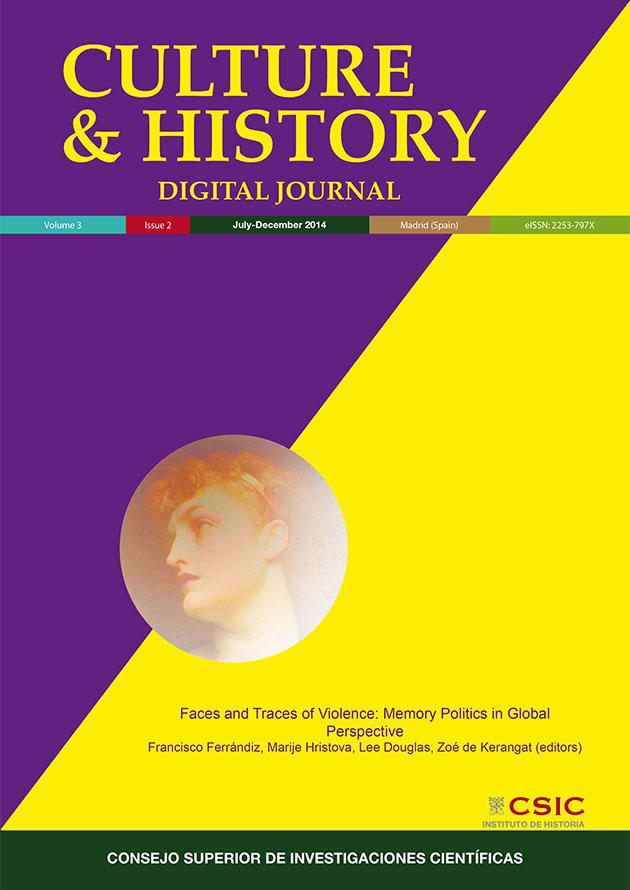Faces and Traces of Violence: Memory Politics in Global Perspective
|
Publication date
|
Title | Editors | Type |
|---|---|---|---|
|
Diciembre 2014
|
Faces and Traces of Violence: Memory Politics in Global Perspective | Francisco Ferrándiz, Marije Hristova, Lee Douglas, Zoé de Kerangat | Dossier |
 Abstract: «This dossier displays a selection of the work presented during the last six years in the permanent international seminar Faces and Traces of Violence/Rastros y rostros de la violencia held monthly at ILLA-CCHS-CSIC. […] Since its beginning, the seminar has been a space for public and academic debate, and its main objective has been the development of critical, comparative and interdisciplinary analyses of different manifestations of violence (especially political and war-related violence) both historically and in the present moment, as well as the development of careful reflections regarding the intricate memory politics that have emerged as a result the contingent reactivation of these violent acts, both in the past and the present. […] The seminar sessions have witnessed lively debates on topics including the following: militaristic representations of the world; memory and mourning in Argentina and Chile; the role of forensic science in the investigation of political violence; the connections between memory, philosophy and theater; the cinematographic recycling of political violence; the forms and meaning of poetry in post-war contexts; the “transnationalization” of forced disappearances and other victimhood models; the use of media in peace-building; the gray areas of the Gypsy Holocaust; the effects of transitional justice policies in post-war Bosnia; the structural violence affecting border crossings in Northern Mexico; how material objects elicit memory in traumatic contexts; the evolution of contemporary memory politics in Spain and Latin America; transnational memory practices and identity politics in contemporary El Salvador; the social and political effects of confessions of perpetrators in the framework of truth commissions; the development of a memory “market” in Latin America; the relationship between human rights and copy rights; the painful re-elaboration of Nazism and the horrors of the Second World War in Austria and Germany; the role of the new media in the creation of new modalities of witnessing and victimhood; the contemporary management of the corpses of mass violence; the role of ruins in the making of national memories; the bureaucratic aftermath of massacres in Colombia; and the memorial processes linked to exiles, diasporas and genocides. Or, as displayed in this dossier’s selection of articles, the seminar has also touched upon other equally diverse topics such as the configuration of cosmopolitan memories on a global scale after the Holocaust; the critical analysis of the tropes and narratives used both in historiography and public debates to define Europe’s violent twentieth century; the shocking aftermath of the experience of the Soviet Gulag for some Bolshevik loyalists; the emergence of global memoryscapes in France; the politics behind the non-remembrance of the Holocaust in Hungary; the attempts to deal with the legacy of the dictatorship in Portugal; the impact of mass grave exhumations from the Spanish Civil War in the reactivation of conflicting memories of the conflict; the difficulties in accessing and making sense of the archives of violence in the aftermath of Spanish dictatorship; the tensions between memorial places and national heritage in post-Pinochet Chile; and the enormous power of forced disappearances to disrupt the social fabric in contemporary Mexico. […]»
Abstract: «This dossier displays a selection of the work presented during the last six years in the permanent international seminar Faces and Traces of Violence/Rastros y rostros de la violencia held monthly at ILLA-CCHS-CSIC. […] Since its beginning, the seminar has been a space for public and academic debate, and its main objective has been the development of critical, comparative and interdisciplinary analyses of different manifestations of violence (especially political and war-related violence) both historically and in the present moment, as well as the development of careful reflections regarding the intricate memory politics that have emerged as a result the contingent reactivation of these violent acts, both in the past and the present. […] The seminar sessions have witnessed lively debates on topics including the following: militaristic representations of the world; memory and mourning in Argentina and Chile; the role of forensic science in the investigation of political violence; the connections between memory, philosophy and theater; the cinematographic recycling of political violence; the forms and meaning of poetry in post-war contexts; the “transnationalization” of forced disappearances and other victimhood models; the use of media in peace-building; the gray areas of the Gypsy Holocaust; the effects of transitional justice policies in post-war Bosnia; the structural violence affecting border crossings in Northern Mexico; how material objects elicit memory in traumatic contexts; the evolution of contemporary memory politics in Spain and Latin America; transnational memory practices and identity politics in contemporary El Salvador; the social and political effects of confessions of perpetrators in the framework of truth commissions; the development of a memory “market” in Latin America; the relationship between human rights and copy rights; the painful re-elaboration of Nazism and the horrors of the Second World War in Austria and Germany; the role of the new media in the creation of new modalities of witnessing and victimhood; the contemporary management of the corpses of mass violence; the role of ruins in the making of national memories; the bureaucratic aftermath of massacres in Colombia; and the memorial processes linked to exiles, diasporas and genocides. Or, as displayed in this dossier’s selection of articles, the seminar has also touched upon other equally diverse topics such as the configuration of cosmopolitan memories on a global scale after the Holocaust; the critical analysis of the tropes and narratives used both in historiography and public debates to define Europe’s violent twentieth century; the shocking aftermath of the experience of the Soviet Gulag for some Bolshevik loyalists; the emergence of global memoryscapes in France; the politics behind the non-remembrance of the Holocaust in Hungary; the attempts to deal with the legacy of the dictatorship in Portugal; the impact of mass grave exhumations from the Spanish Civil War in the reactivation of conflicting memories of the conflict; the difficulties in accessing and making sense of the archives of violence in the aftermath of Spanish dictatorship; the tensions between memorial places and national heritage in post-Pinochet Chile; and the enormous power of forced disappearances to disrupt the social fabric in contemporary Mexico. […]»
Francisco Ferrándiz (ILLA-CCHS, CSIC)
Culture & History Digital Journal


